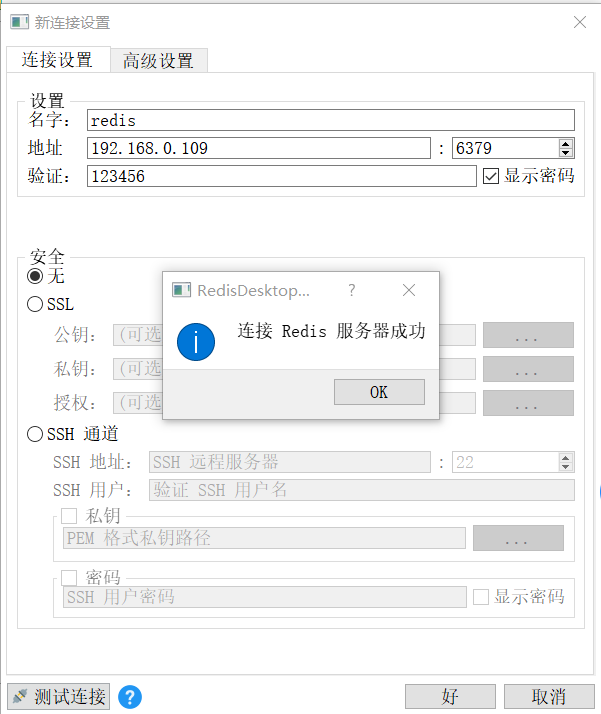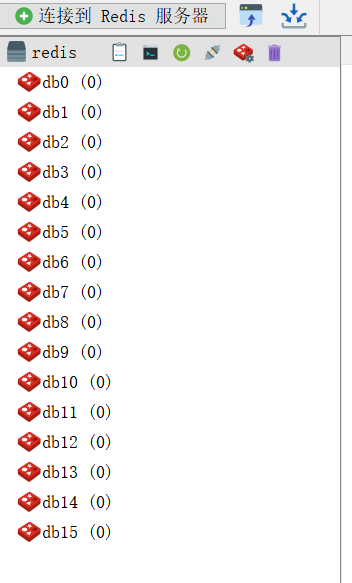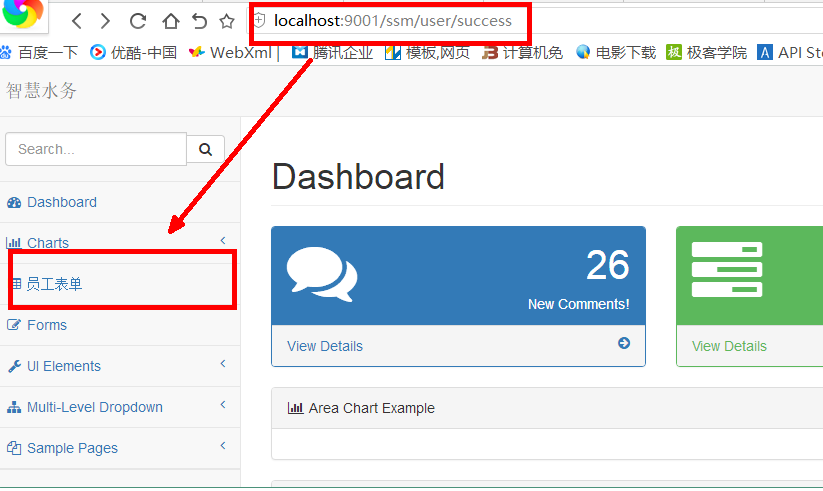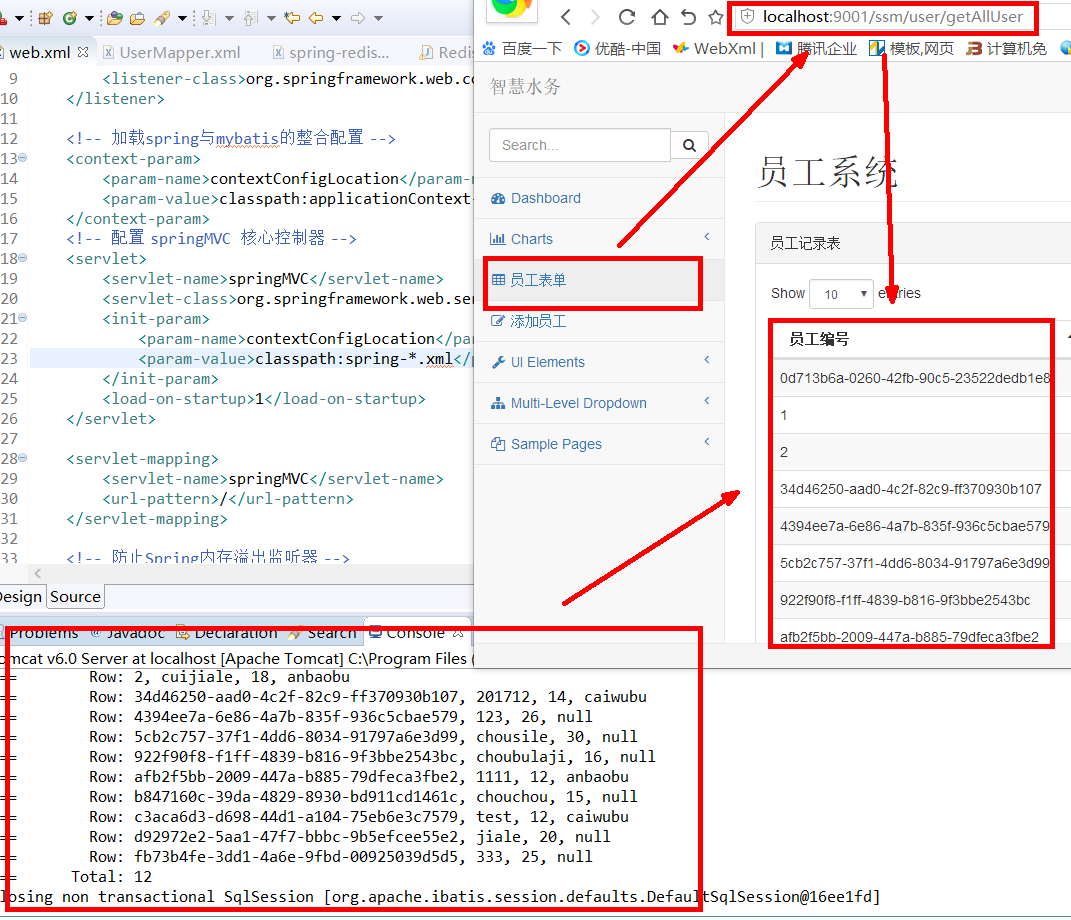03.redis与ssm整合(mybatis二级缓存)
SSM+redis整合
ssm框架之前已经搭建过了,这里不再做代码复制工作。
这里主要是利用redis去做mybatis的二级缓存,mybaits映射文件中所有的select都会刷新已有缓存,如果不存在就会新建缓存,所有的insert,update操作都会更新缓存。
redis的好处也显而易见,可以使系统的数据访问性能更高。本节只是展示了整合方法和效果,后面会补齐redis集群、负载均衡和session共享的文章。
下面就开始整合工作:

后台首先启动redis-server(后台启动与远程连接linux服务的方法都需要改redis.conf文件),启动命令“./src/redis-server ./redis.conf”
我这里是windows系统下开发的,推荐一个可视化工具“Redis Desktop manager”,需要远程连接linux下的redis,需要linux下开启端口对外开放(具体方法是修改/etc/sysconfig/iptables文件,增加对外端口开发命令)。
以上操作都完成后,即可远程连接成功了,如图:


现在还没有缓存记录,下面进入代码阶段,首先在pom.xml中增加需要的redis jar包
- <dependency>
- <groupId>redis.clients</groupId>
- <artifactId>jedis</artifactId>
- <version>2.9.0</version>
- </dependency>
- <dependency>
- <groupId>org.springframework.data</groupId>
- <artifactId>spring-data-redis</artifactId>
- <version>1.6.2.RELEASE</version>
- </dependency>
- <dependency>
- <groupId>org.mybatis</groupId>
- <artifactId>mybatis-ehcache</artifactId>
- <version>1.0.0</version>
- </dependency>
- <!-- 添加druid连接池包 -->
- <dependency>
- <groupId>com.alibaba</groupId>
- <artifactId>druid</artifactId>
- <version>1.0.24</version>
- </dependency>
pom.xml写好后,还需要新增两个配置文件:redis.properties
- redis.host=192.168.0.109
- redis.port=6379
- redis.pass=123456
- redis.maxIdle=200
- redis.maxActive=1024
- redis.maxWait=10000
- redis.testOnBorrow=true
其中字段也都很好理解,再加入配置文件:spring-redis.xml
- <beans xmlns="http://www.springframework.org/schema/beans"
- xmlns:xsi="http://www.w3.org/2001/XMLSchema-instance"
- xmlns:p="http://www.springframework.org/schema/p"
- xmlns:mvc="http://www.springframework.org/schema/mvc"
- xmlns:util="http://www.springframework.org/schema/util"
- xmlns:aop="http://www.springframework.org/schema/aop"
- xmlns:context="http://www.springframework.org/schema/context"
- xmlns:task="http://www.springframework.org/schema/task"
- xsi:schemaLocation="http://www.springframework.org/schema/beans
- http://www.springframework.org/schema/beans/spring-beans-4.3.xsd
- http://www.springframework.org/schema/util
- http://www.springframework.org/schema/util/spring-util-4.3.xsd
- http://www.springframework.org/schema/mvc
- http://www.springframework.org/schema/mvc/spring-mvc-4.3.xsd
- http://www.springframework.org/schema/aop
- http://www.springframework.org/schema/aop/spring-aop-4.3.xsd
- http://www.springframework.org/schema/context
- http://www.springframework.org/schema/context/spring-context-4.3.xsd">
- <!-- 连接池基本参数配置,类似数据库连接池 -->
- <context:property-placeholder location="classpath*:redis.properties" />
- <bean id="poolConfig" class="redis.clients.jedis.JedisPoolConfig">
- <property name="maxTotal" value="${redis.maxActive}"/>
- <property name="maxIdle" value="${redis.maxIdle}" />
- <property name="testOnBorrow" value="${redis.testOnBorrow}"/>
- </bean>
- <!-- 连接池配置,类似数据库连接池 -->
- <bean id="jedisConnectionFactory" class="org.springframework.data.redis.connection.jedis.JedisConnectionFactory" >
- <property name="hostName" value="${redis.host}"></property>
- <property name="port" value="${redis.port}"></property>
- <property name="password" value="${redis.pass}"></property>
- <property name="poolConfig" ref="poolConfig"></property>
- </bean>
- <!-- 调用连接池工厂配置 -->
- <!-- <bean id="redisTemplate" class=" org.springframework.data.redis.core.RedisTemplate">
- <property name="jedisConnectionFactory" ref="jedisConnectionFactory"></property>
- 如果不配置Serializer,那么存储的时候智能使用String,如果用User类型存储,那么会提示错误User can't cast to String!!!
- <property name="keySerializer">
- <bean
- class="org.springframework.data.redis.serializer.StringRedisSerializer" />
- </property>
- <property name="valueSerializer">
- <bean
- class="org.springframework.data.redis.serializer.JdkSerializationRedisSerializer" />
- </property>
- </bean> -->
- <bean id="redisCacheTransfer" class="com.cjl.util.RedisCacheTransfer">
- <property name="jedisConnectionFactory" ref="jedisConnectionFactory" />
- </bean>
- </beans>
配置文件写好后,就开始java代码的编写:
JedisClusterFactory.java
- package com.cjl.util;
- import java.util.HashSet;
- import java.util.Properties;
- import java.util.Set;
- import java.util.regex.Pattern;
- import org.apache.commons.pool2.impl.GenericObjectPoolConfig;
- import org.springframework.beans.factory.FactoryBean;
- import org.springframework.beans.factory.InitializingBean;
- import org.springframework.core.io.Resource;
- import redis.clients.jedis.HostAndPort;
- import redis.clients.jedis.JedisCluster;
- public class JedisClusterFactory implements FactoryBean<JedisCluster>, InitializingBean {
- private Resource addressConfig;
- private String addressKeyPrefix;
- private JedisCluster jedisCluster;
- private Integer timeout;
- private Integer maxRedirections;
- private GenericObjectPoolConfig genericObjectPoolConfig;
- private Pattern p = Pattern.compile("^.+[:]\\d{1,5}\\s*$");
- public JedisCluster getObject() throws Exception {
- return jedisCluster;
- }
- public Class<? extends JedisCluster> getObjectType() {
- return (this.jedisCluster != null ? this.jedisCluster.getClass() : JedisCluster.class);
- }
- public boolean isSingleton() {
- return true;
- }
- private Set<HostAndPort> parseHostAndPort() throws Exception {
- try {
- Properties prop = new Properties();
- prop.load(this.addressConfig.getInputStream());
- Set<HostAndPort> haps = new HashSet<HostAndPort>();
- for (Object key : prop.keySet()) {
- if (!((String) key).startsWith(addressKeyPrefix)) {
- continue;
- }
- String val = (String) prop.get(key);
- boolean isIpPort = p.matcher(val).matches();
- if (!isIpPort) {
- throw new IllegalArgumentException("ip 或 port 不合法");
- }
- String[] ipAndPort = val.split(":");
- HostAndPort hap = new HostAndPort(ipAndPort[0], Integer.parseInt(ipAndPort[1]));
- haps.add(hap);
- }
- return haps;
- } catch (IllegalArgumentException ex) {
- throw ex;
- } catch (Exception ex) {
- throw new Exception("解析 jedis 配置文件失败", ex);
- }
- }
- public void afterPropertiesSet() throws Exception {
- Set<HostAndPort> haps = this.parseHostAndPort();
- jedisCluster = new JedisCluster(haps, timeout, maxRedirections, genericObjectPoolConfig);
- }
- public void setAddressConfig(Resource addressConfig) {
- this.addressConfig = addressConfig;
- }
- public void setTimeout(int timeout) {
- this.timeout = timeout;
- }
- public void setMaxRedirections(int maxRedirections) {
- this.maxRedirections = maxRedirections;
- }
- public void setAddressKeyPrefix(String addressKeyPrefix) {
- this.addressKeyPrefix = addressKeyPrefix;
- }
- public void setGenericObjectPoolConfig(GenericObjectPoolConfig genericObjectPoolConfig) {
- this.genericObjectPoolConfig = genericObjectPoolConfig;
- }
- }
RedisCache.java
- package com.cjl.util;
- import java.util.concurrent.locks.ReadWriteLock;
- import java.util.concurrent.locks.ReentrantReadWriteLock;
- import org.apache.ibatis.cache.Cache;
- import org.slf4j.Logger;
- import org.slf4j.LoggerFactory;
- import org.springframework.data.redis.connection.jedis.JedisConnection;
- import org.springframework.data.redis.connection.jedis.JedisConnectionFactory;
- import org.springframework.data.redis.serializer.JdkSerializationRedisSerializer;
- import org.springframework.data.redis.serializer.RedisSerializer;
- import redis.clients.jedis.exceptions.JedisConnectionException;
- public class RedisCache implements Cache {
- private static final Logger logger = LoggerFactory.getLogger(RedisCache.class);
- private static JedisConnectionFactory jedisConnectionFactory;
- private final String id;
- private final ReadWriteLock rwl = new ReentrantReadWriteLock();
- public RedisCache(final String id) {
- if (id == null) {
- throw new IllegalArgumentException("Cache instances require an ID");
- }
- logger.debug("MybatisRedisCache:id=" + id);
- this.id = id;
- }
- /**
- * 清空所有缓存
- */
- public void clear() {
- rwl.readLock().lock();
- JedisConnection connection = null;
- try {
- connection = jedisConnectionFactory.getConnection();
- connection.flushDb();
- connection.flushAll();
- } catch (JedisConnectionException e) {
- e.printStackTrace();
- } finally {
- if (connection != null) {
- connection.close();
- }
- rwl.readLock().unlock();
- }
- }
- public String getId() {
- return this.id;
- }
- /**
- * 获取缓存总数量
- */
- public int getSize() {
- int result = 0;
- JedisConnection connection = null;
- try {
- connection = jedisConnectionFactory.getConnection();
- result = Integer.valueOf(connection.dbSize().toString());
- logger.info("添加mybaits二级缓存数量:" + result);
- } catch (JedisConnectionException e) {
- e.printStackTrace();
- } finally {
- if (connection != null) {
- connection.close();
- }
- }
- return result;
- }
- public void putObject(Object key, Object value) {
- rwl.writeLock().lock();
- JedisConnection connection = null;
- try {
- connection = jedisConnectionFactory.getConnection();
- RedisSerializer<Object> serializer = new JdkSerializationRedisSerializer();
- connection.set(SerializeUtil.serialize(key), SerializeUtil.serialize(value));
- logger.info("添加mybaits二级缓存key=" + key + ",value=" + value);
- } catch (JedisConnectionException e) {
- e.printStackTrace();
- } finally {
- if (connection != null) {
- connection.close();
- }
- rwl.writeLock().unlock();
- }
- }
- public Object getObject(Object key) {
- // 先从缓存中去取数据,先加上读锁
- rwl.readLock().lock();
- Object result = null;
- JedisConnection connection = null;
- try {
- connection = jedisConnectionFactory.getConnection();
- RedisSerializer<Object> serializer = new JdkSerializationRedisSerializer();
- result = serializer.deserialize(connection.get(serializer.serialize(key)));
- logger.info("命中mybaits二级缓存,value=" + result);
- } catch (JedisConnectionException e) {
- e.printStackTrace();
- } finally {
- if (connection != null) {
- connection.close();
- }
- rwl.readLock().unlock();
- }
- return result;
- }
- public Object removeObject(Object key) {
- rwl.writeLock().lock();
- JedisConnection connection = null;
- Object result = null;
- try {
- connection = jedisConnectionFactory.getConnection();
- RedisSerializer<Object> serializer = new JdkSerializationRedisSerializer();
- result = connection.expire(serializer.serialize(key), 0);
- } catch (JedisConnectionException e) {
- e.printStackTrace();
- } finally {
- if (connection != null) {
- connection.close();
- }
- rwl.writeLock().unlock();
- }
- return result;
- }
- public static void setJedisConnectionFactory(JedisConnectionFactory jedisConnectionFactory) {
- RedisCache.jedisConnectionFactory = jedisConnectionFactory;
- }
- public ReadWriteLock getReadWriteLock() {
- // TODO Auto-generated method stub
- return rwl;
- }
- }
RedisCacheTransfer.java
- package com.cjl.util;
- import org.springframework.beans.factory.annotation.Autowired;
- import org.springframework.data.redis.connection.jedis.JedisConnectionFactory;
- /**
- * 静态注入中间类
- */
- public class RedisCacheTransfer {
- @Autowired
- public void setJedisConnectionFactory(JedisConnectionFactory jedisConnectionFactory) {
- RedisCache.setJedisConnectionFactory(jedisConnectionFactory);
- }
- }
SerializeUtil.java
- package com.cjl.util;
- import java.io.ByteArrayInputStream;
- import java.io.ByteArrayOutputStream;
- import java.io.ObjectInputStream;
- import java.io.ObjectOutputStream;
- /**
- *
- * @author cjl
- *
- */
- public class SerializeUtil {
- /**
- * 序列化
- */
- public static byte[] serialize(Object object) {
- ObjectOutputStream oos = null;
- ByteArrayOutputStream baos = null;
- try {
- // 序列化
- baos = new ByteArrayOutputStream();
- oos = new ObjectOutputStream(baos);
- oos.writeObject(object);
- byte[] bytes = baos.toByteArray();
- return bytes;
- } catch (Exception e) {
- e.printStackTrace();
- }
- return null;
- }
- /**
- *反序列化
- */
- public static Object unserialize(byte[] bytes) {
- if (bytes !=null) {
- ByteArrayInputStream bais = null;
- try {
- // 反序列化
- bais = new ByteArrayInputStream(bytes);
- ObjectInputStream ois = new ObjectInputStream(bais);
- return ois.readObject();
- } catch (Exception e) {
- }
- }
- return null;
- }
- }
所有东西准备齐全后还需要修改映射文件

要使mybaits缓存生效,还需如上图这样开启二级缓存。配置文件还需要在web.xml中加载生效

一切准备就绪后,启动服务

启动成功后,点击员工表单可以触发查询所有员工的方法,第一次进行查询语句可以看到mybatis打印了查询语句,并在redis服务器中更新了一条缓存


我们清空控制台再次点击查询员工按钮执行查询方法,可以看到没有执行查询语句,证明第二次查询直接从缓存中取值,没有连接mysql进行查询。

以上整合基本已经完成,如有不对的地方希望大家能够指出,后面会补上负载均衡和session共享。
03.redis与ssm整合(mybatis二级缓存)的更多相关文章
- Spring Boot 入门(十):集成Redis哨兵模式,实现Mybatis二级缓存
本片文章续<Spring Boot 入门(九):集成Quartz定时任务>.本文主要基于redis实现了mybatis二级缓存.较redis缓存,mybaits自带缓存存在缺点(自行谷歌) ...
- mybatis二级缓存应用及与ehcache整合
mybaits的二级缓存是mapper范围级别,除了在SqlMapConfig.xml设置二级缓存的总开关,还要在具体的mapper.xml中开启二级缓存. 1.开启mybatis的二级缓存 在核心配 ...
- Springboot整合Ehcache 解决Mybatis二级缓存数据脏读 -详细
前面有写了一篇关于这个,但是这几天又改进了一点,就单独一篇在详细说明一下 配置 application.properties ,启用Ehcache # Ehcache缓存 spring.cache.t ...
- mybatis二级缓存
二级缓存区域是根据mapper的namespace划分的,相同namespace的mapper查询数据放在同一个区域,如果使用mapper代理方法每个mapper的namespace都不同,此时可以理 ...
- Mybatis 二级缓存应用 (21)
[MyBatis 二级缓存] 概述:一级缓存作用域为同一个SqlSession对象,而二级缓存用来解决一级缓存不能夸会话共享,作用范围是namespace级,可以被多个SqlSession共享(只要是 ...
- 深入了解MyBatis二级缓存
深入了解MyBatis二级缓存 标签: mybatis二级缓存 2015-03-30 08:57 41446人阅读 评论(13) 收藏 举报 分类: Mybatis(51) 版权声明:版权归博主所 ...
- MyBatis二级缓存配置
正如大多数持久层框架一样,MyBatis 同样提供了一级缓存和二级缓存的支持 Mybatis二级缓存是SessionFactory,如果两次查询基于同一个SessionFactory,那么就从二级缓存 ...
- 如何细粒度地控制你的MyBatis二级缓存(mybatis-enhanced-cache插件实现)
前几天网友chanfish 给我抛出了一个问题,笼统地讲就是如何能细粒度地控制MyBatis的二级缓存问题,酝酿了几天,觉得可以写个插件来实现这个这一功能.本文就是从问题入手,一步步分析现存的MyBa ...
- MyBatis 二级缓存全详解
目录 MyBatis 二级缓存介绍 二级缓存开启条件 探究二级缓存 二级缓存失效的条件 第一次SqlSession 未提交 更新对二级缓存影响 探究多表操作对二级缓存的影响 二级缓存源码解析 二级缓存 ...
随机推荐
- EF 数据重复和缺失问题(select 错误 )
字段有 id,name,password,sex 1.错误举例: var data = db.User.Select(d => d): 2修正 var data = db.User.Sele ...
- 【前端】javascript实现导航栏筋斗云效果特效
实现效果: 实现效果如下图所示 实现原理: 什么是筋斗云效果: 这个效果很简单,就是鼠标移到其他导航目录时会有背景图片跟着鼠标滑动到当前的目录. 实现思路: 鼠标经过的时候,利用offsetLeft获 ...
- Phonegap开发相关问题
环境搭建:参考http://www.phonegapcn.com/start/zh/1.3/#android 调试: 1.在线远程调试 http://debug.phonegap.com/ 通过USB ...
- css 行内元素设置宽高
有2中实现方法: 1.设置display:block inline-block,使其width属性生效 2.如果设置float:left | right, 使其width属性生效. (浮动)使得指 ...
- python迭代器以及itertools模块
迭代器 在python中,迭代器协议就是实现对象的__iter()方法和next()方法,其中前者返回对象本身,后者返回容器的下一个元素.实现了这两个方法的对象就是可迭代对象.迭代器是有惰性的,只有在 ...
- VMware系统克隆
第1章 搭建VMware实战环境 1.1 vmware主机配置-网络配置 1.1.1 虚拟主机添加网卡信息(5) a.右键虚拟主机→设置→添加虚拟网卡硬件设备 b.设置网络适配器类型→完成添加 1.1 ...
- Java_数据交换_fastJSON_01_用法入门
一.用法 1.序列化—将Object转为Json对象 Object data=JSON.toJSON( MyObject ); 注:本文的Object可以是Map.List.javaBean等 需求: ...
- 《项目架构那点儿事》——快速构建Junit用例
[前 言]按照惯例,在实际项目中我往往会对自己编写的程序进行测试,当测试通过后才能将其用于实战中,当然,编写单元测试是不可避免的,可以直接清晰的检验出 我们程序的可靠性.可只执行性,从中发现问题从而得 ...
- [转载] ETL和Kettle
http://tech.ccidnet.com/art/1105/20080407/1411567_1.html http://blog.csdn.net/cissyring/article/deta ...
- 前端面试题(5) 列举5种IE haslayout的属性及其值
haslayout 是Windows Internet Explorer渲染引擎的一个内部组成部分.在Internet Explorer中,一个元素要么自己对自身的内容进行计算大小和组织,要么依赖于父 ...
